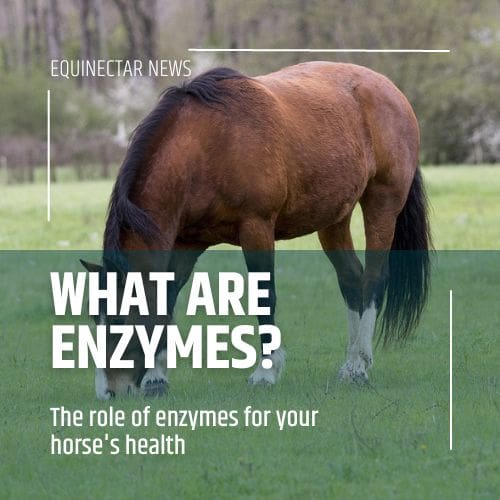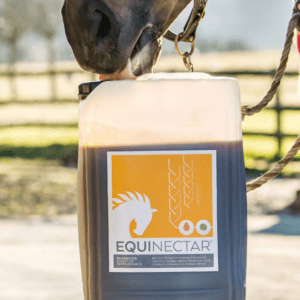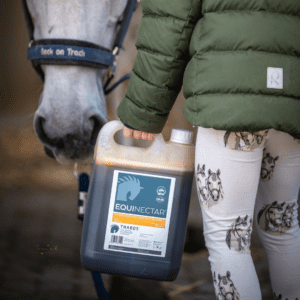Today we speak to renowned toxicologist and Tharos company director, Dr Rosemary Waring. Dr Waring will be speaking to us about enzymes, their role in the body and their significance to a horse’s digestive system.
What are enzymes?
Enzymes are proteins that catalyse chemical reactions in the body. They are essential for many biological processes, including digestion, metabolism, and cellular repair. Enzymes are specific to the reactions they catalyse and play a crucial role in maintaining the balance of chemical reactions in the body.
What role do enzymes play in the digestive system, particularly in the equine digestive system?
Enzymes play a crucial role in the digestive system by breaking down the large molecules in food into smaller molecules that can be easily absorbed by the body. In the equine digestive system, enzymes such as amylases and proteases break down carbohydrates and proteins, respectively, into smaller molecules that can be used by the horse’s body for energy and other functions. The enzymes in the equine digestive system are produced by the horse’s pancreas and small intestine, and they work in concert with other digestive organs, such as the stomach and liver, to break down the horse’s food and extract the nutrients it needs.
What role does the equine microbiome play in the production of enzymes?
The equine microbiome, which is the community of bacteria, fungi, and other microorganisms that live in the horse’s digestive tract, plays a role in the production of enzymes that are essential for the digestion of food. These microorganisms produce a variety of enzymes that help break down the complex molecules in the horse’s diet into smaller molecules that can be easily absorbed by the body. For example, some bacteria in the equine microbiome produce enzymes that break down cellulose, which is a complex carbohydrate found in plant cell walls, into simpler sugars that the horse’s body can use for energy. Overall, the equine microbiome is an important contributor to the horse’s digestive health and plays a role in the production of enzymes that are essential for the efficient digestion of food.
What happens if there are insufficient enzymes in the horse’s digestive system?
If there are insufficient enzymes in the horse’s digestive system, the horse may have difficulty digesting its food properly. This can lead to a variety of problems, including poor nutrient absorption, weight loss, and decreased appetite. In severe cases, a lack of enzymes in the horse’s digestive system can lead to malnutrition and other health problems. It is important for horses to have a balanced and varied diet that provides them with the enzymes they need to properly digest their food. If a horse has a condition that affects its ability to produce enzymes, the veterinarian may recommend supplements to ensure that the horse gets the enzymes it needs.
Do the enzyme requirements of a horse change depending on what the horse eats?
Yes, the enzyme requirements of a horse can change depending on what the horse eats. Different types of food require different enzymes to break them down, so a horse that eats a diet that is high in carbohydrates will have different enzyme requirements than a horse that eats a diet that is high in protein. Additionally, the amount of enzymes that a horse needs can vary depending on the horse’s age, activity level, and health status. For example, a young, active horse will have higher enzyme requirements than an older, sedentary horse.
If my horse eats a high starch feed to provide energy for performance, what impact does that have on the enzyme requirements?
If a horse eats a high-starch feed to provide energy for performance, it will have higher enzyme requirements than a horse that eats a lower-starch diet. This is because starch is a complex carbohydrate that requires specific enzymes to break it down into simpler sugars that the horse’s body can use for energy. If a horse does not have enough of these enzymes, it may have difficulty digesting the starch in its feed, which can lead to digestive problems and decreased performance.
Which enzymes are involved in the digestion of starch?
The enzymes that are involved in the digestion of starch are called amylases. These enzymes break down starch into simpler sugars, such as glucose, that the horse’s body can use for energy. Amylases are produced by the horse’s pancreas and small intestine, and they work in concert with other digestive organs, such as the stomach and liver, to break down the starch in the horse’s diet. If a horse does not have enough amylases, it may have difficulty digesting starch and may develop digestive problems. To ensure that a horse has the enzymes it needs to properly digest starch, we would suggest that feeding EquiNectar could be beneficial.
Which enzymes are involved in digesting grass?
The enzymes that are involved in digesting grass are called cellulases. These enzymes break down cellulose, which is a complex carbohydrate found in the cell walls of plants, into simpler sugars that the horse’s body can use for energy. Cellulases are produced by microorganisms in the horse’s digestive tract, such as bacteria and fungi, and they work in concert with other digestive organs, such as the stomach and small intestine, to break down the cellulose in grass.
Additionally, fructans are a type of complex carbohydrate that is found in grasses and other plants, and they require specific enzymes to break them down into simpler sugars that the horse’s body can use for energy. The enzymes that are involved in the digestion of fructans are called fructanases. Fructanases are also produced by microorganisms in the horse’s digestive tract.





